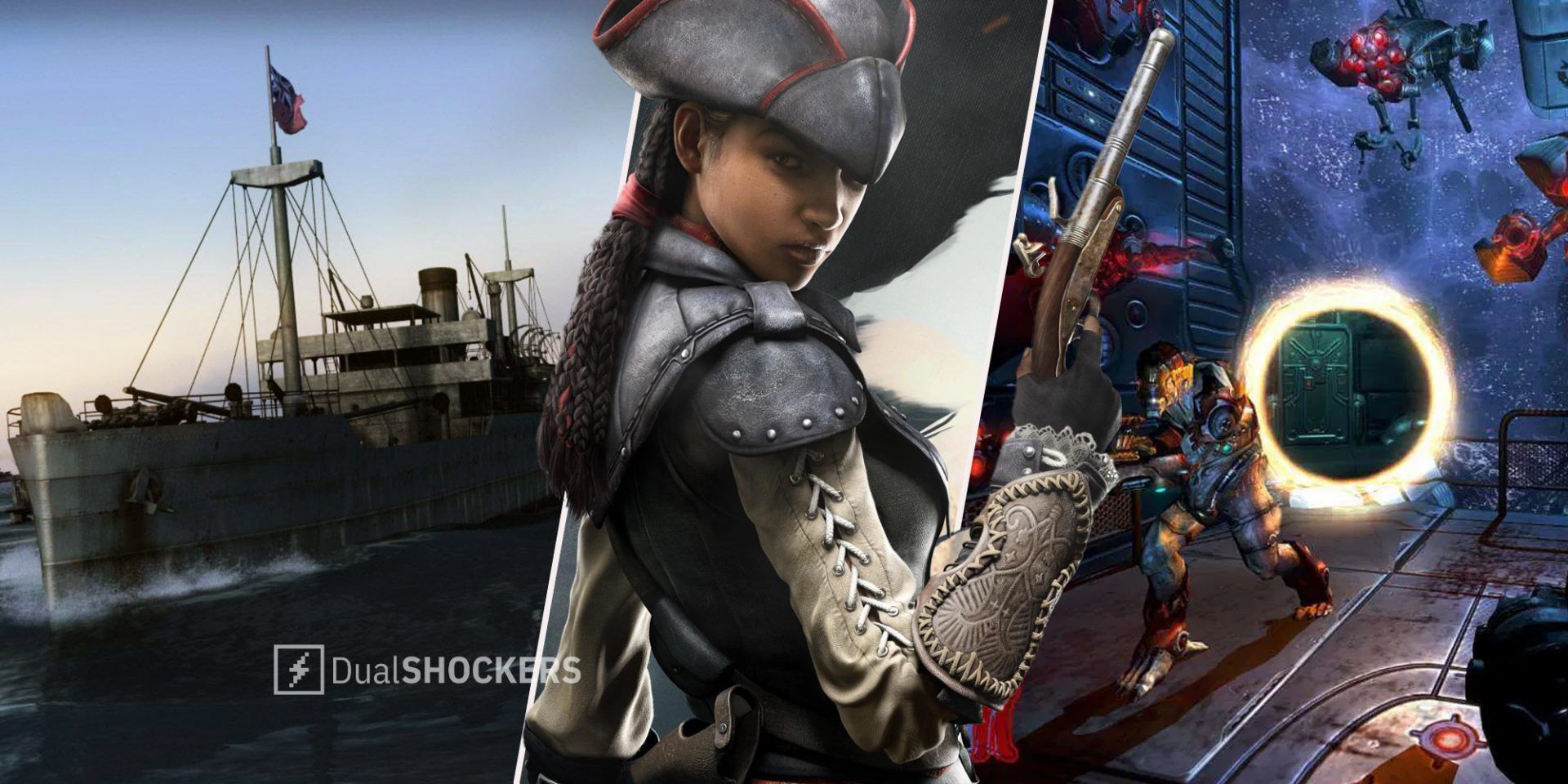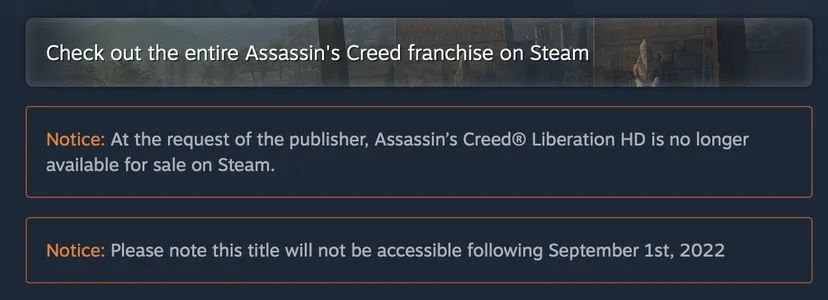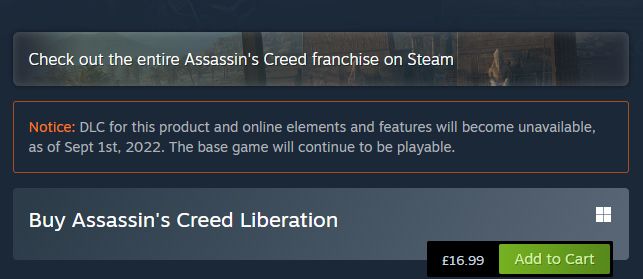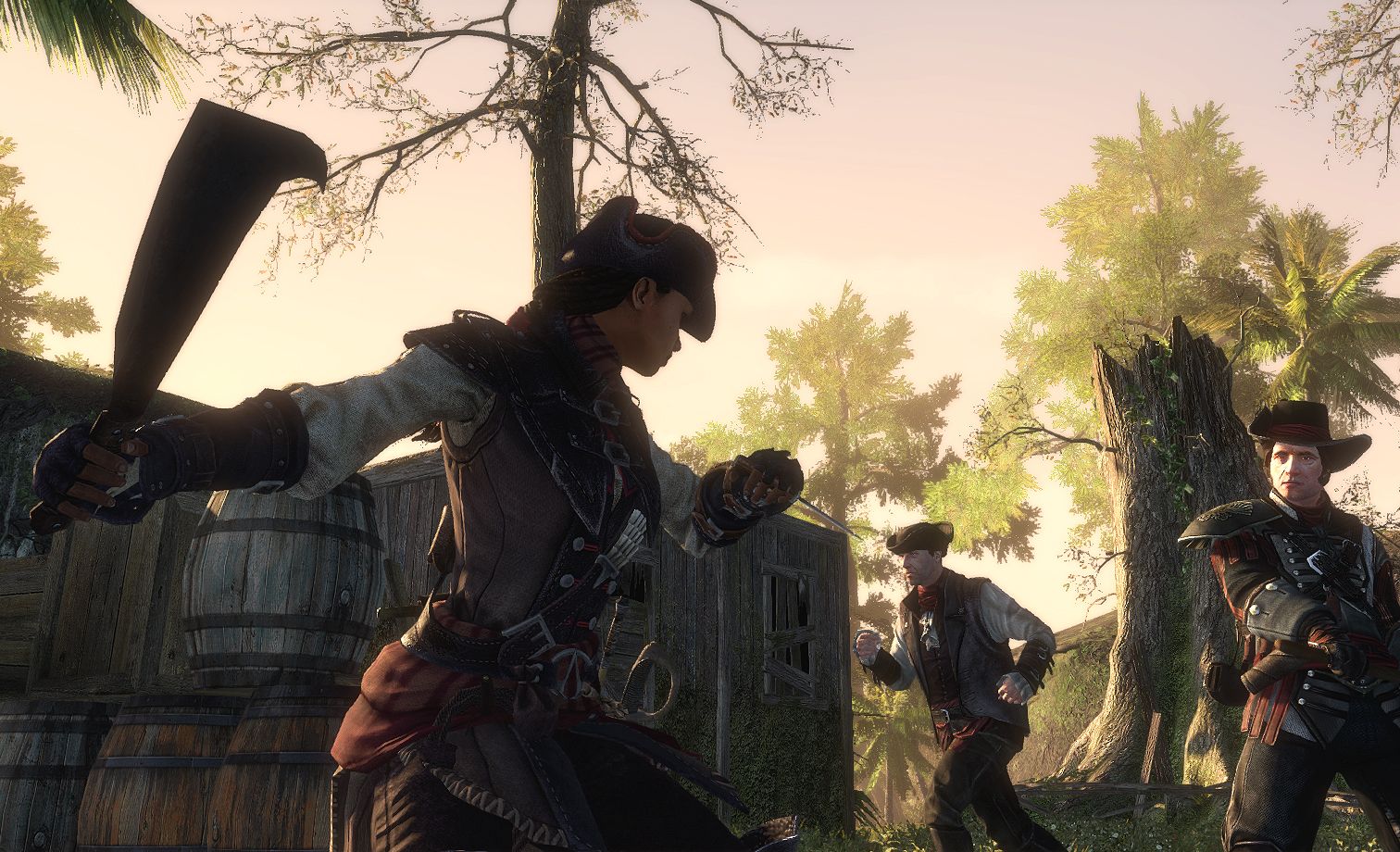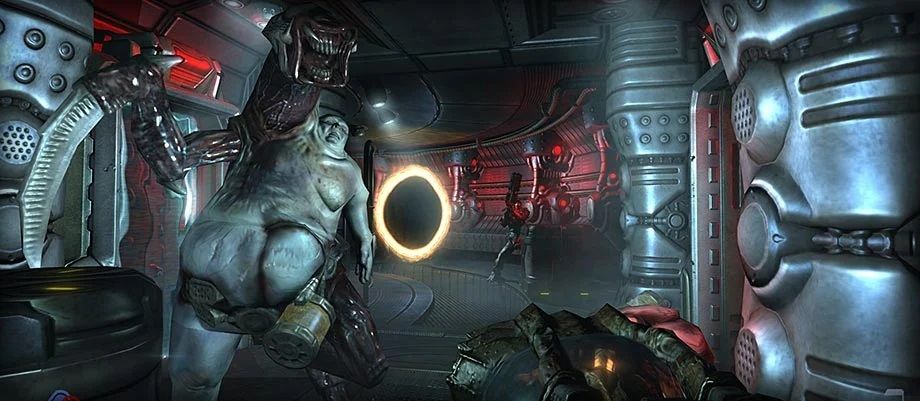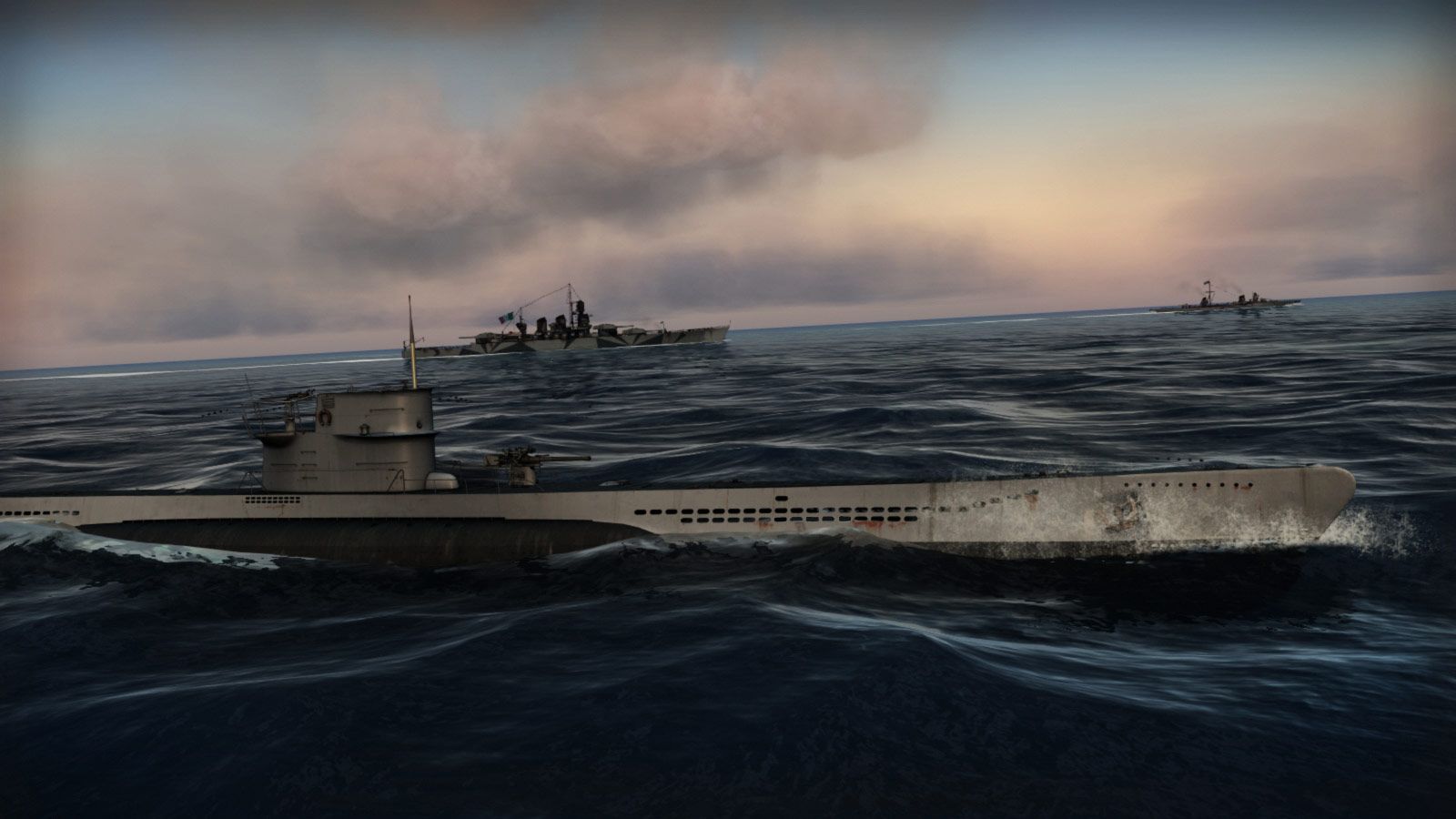UPDATE: Since yesterday, Ubisoft has updated their statement (and Silent Hunter 5 and Assassin's Creed Liberation HD Steam pages) to say that these games will in fact continue to be accessible for existing owners. Our original information was based on the fact that the Steam pages for Silent Hunter 5 and Assassin's Creed Liberation HD said that both games would "not be accessible following September 1st, 2022." Here's the snippet of what was on the Steam until yesterday:
At some point, Ubisoft updated the notice to say this:
So either Ubisoft did a u-turn following fan backlash or they made a mistake in the original listing. Either way, it's not a good look, and while what I write below has been partially made redundant following this correction (or reversal), there's still a lot in there about dodgy DRM practices that I believe is valuable to readers. This was written based on information that Ubisoft put out and then revoked (a bit like their online services, am I right?), so let it serve as a warning to them not to put out alarming information like that again.
Last week was a bad week in the world of digital ownership, giving a worrying insight into a reality that for a long time we've wanted to deny to ourselves: that we don't really own our games when we purchase them digitally, but rather are leasing them from fickle landlords (that's publishers) who revoke our access to these games at any moment.
I'm talking about Ubisoft's decommissioning of the online components of 15 of its older (though not in all cases) games, which I covered last week. This didn't just entail closing down long-empty multiplayer servers for ancient shooters, but co-op features that should have been playable via LAN, core single-player game features (as in Anno 2070), and unspecified DLC for single-player games. When I reached out to Ubisoft for comment, they came back with the following:
“We don’t take the decision to retire services for older Ubisoft games lightly, and our teams are currently assessing all available options for players who will be impacted when these games’ online services are decommissioned on September 1st, 2022. We are also working with our partners to update this information across all storefronts, so players will be fully informed about the removal of online services at the point of purchase as well as via our support article where we shared the news.”
Conveniently vague, then, though seeing as they're "assessing all available options" for when these games and services go down in several weeks time, we'll be checking back in then to see what action they wind up taking.
Until now, the issue seemed confined to games which had some form of online features (however tenuous) but over the weekend we learned that Ubisoft will also be pulling and revoking access to a fully-fledged single-player game, Assassin's Creed Liberation HD, from Steam as well as its own Ubisoft Connect platform from September 1. What makes this especially egregious is the fact that Assassin's Creed Liberation was actually on sale on Steam just last week, incentivising players to buy a game that they will soon no longer be able to play.
- RELATED - Assassin's Creed Liberation HD Gets Removed From Steam, Will Be Inaccessible From September
Upon closer inspection, it looks like another Ubisoft single-player game, Silent Hunter 5, will also become unavailable to existing owners of the game.
This move isn't unparalleled, even for Ubisoft itself, and may have something to do with the company's shonky DRM structure. Last year, the DRM servers for Might and Magic X: Legacy were deactivated, which meant that players were left unable to play the single-player part of the game. Ubisoft delisted the game from all platforms, before fixing the issues and relisting it five months later. The difference between that and this however, is that that was a technical error on Ubisoft's part, whereas this seems to be very much part of their plan.
While plenty of high-profile games have been pulled from storefronts over the years, they'd almost always remain playable for existing owners. The GTA Definitive Edition Trilogy, for example, resulted in the original versions of GTA III, Vice City and San Andreas being pulled from sale, but they remain playable for existing owners. As Bethesda prepared to release its 2017 game Prey, the original Prey from 2006 was pulled from sale, but those of us lucky enough to get it before then can still play the rather underrated shooter today.
On the other hand, we've seen publishers be similarly draconian in enforcing their will when pulling games from the store. In 2013, the 'Challenge' expansion pack for the wargame Order of War not only had its servers shut down, but was revoked from the Steam store for existing owners and was wiped from the hard drives of people who had the game installed. Granted, this was a failed multiplayer game that had run its course, but the level of intrusion into a product that was ostensibly 'owned' by players was unparalleled.
Prey (2006) was pulled from Steam by Bethesda, but like many single-player games in a similar situation, remains playable to this day.
And yet this feels bigger in its own way, because while multiplayer games are dependent on the enduring interest of other players, with publishers pulling the game once they see that it's 'dead', single-player games don't 'die' in the same way. When we purchase a single-player game, we expect it to be available for us to return to whenever we please - whether that's an annual playthrough or a nostalgic trip down memory lane in 10 years time. Ubisoft taking away games that people have bought with no explanation or remuneration is something that we'd expect from a subscription service like Game Pass, where an endemic part of the service is that games will come and go. What they've done here undermines the very idea of 'buying' or 'purchasing' products, which you ostensibly do through Ubisoft Connect, Steam, and other platforms.
Another question is whether Valve, or more specifically its Steam gaming platform, has any responsibility to those who bought the games in question through it. Clearly, this is Ubisoft's cock-up, but as the de facto gaming platform for PC gamers, which people are loyal to Valve because it offers a depth of features, robustness and communities that elevate it well above rudimentary rivals like GOG or the Epic Games Store. Should Valve be stepping in to defend those who use its platform believing it to be a place where their games library is safe for posterity?
There's a good chance that many people who bought Assassin's Creed Liberation HD or Silent Hunter 5 through Steam aren't even aware that that game is dependent on DRM outside of Steam (despite the smallprint on the store page), that Steam in that context is pretty much a launcher for just another launcher. Put that way, it does sound kind of ridiculous, doesn't it? You can see how less informed people, or perhaps more casual gamers, could get confused.
Valve has been reprimanded in the past for its 'hands off' approach to curating Steam over the years, but that's not to say that it's deaf to feedback. The platform introduced graphs and notifications to identify periods when games were being review-bombed, which let potential buyers not only contextualise its overall rating, but also read up on why a given game was receiving backlash at a given time.
Following years of allowing pretty much any kind of trash to exist on the platform, in 2019 Steam delisted over 1000 games that it believed were abusing the Steamworks system. This was off the back of criticism that Steam wasn't doing enough to weed out the flagrantly scammy hackjob games that were littering the platform.
Silent Hunter 5 is the other single-player game that will no longer be accessible to those who bought it.
But should Steam do more to keep games active for people who purchased them when a third-party publisher tries to revoke them? Perhaps when a publisher like Ubisoft tries to revoke access to a single-player game, Valve should mandate that it remains playable for existing players, and work with the publisher to migrate it to Steam in a playable state without the DRM and other technical bureaucracy. For years, Valve has been taking a 30% cut from the sales of these games, so logically its involvement in holding onto these games should be involvement proportional to its profits. It would be a serious power move by Steam, sending a message that 'your games are safe with us' even when publishers like Ubisoft stop giving a shit.
I discussed in my previous feature about the things Ubisoft could do to soften the blow of a game (or online component) it's killing off: untether online online aspects and servers of games from the Ubisoft infrastructure, make co-op modes playable offline via LAN (and Virtual LAN), grant free upgrades to more recent 'remastered' versions of a game where possible. As for full-on single player games without remastered versions, like Silent Hunter 5, either offer refunds, or remove the stodgy DRM that seemingly is too much of a cost for Ubisoft to maintain.
These are some seriously alarming moves by Ubisoft, and the company could do a lot more to reassure gamers. Even if they put their hands up and admitted what very much appears to be the case, which is that they created a bloated and high-maintenance online DRM infrastructure at some point in the late 2000s that's made these games unsustainable, that they'll do everything possible to make sure buyers of those products are accounted for, and that this won't happen again, that would go a long way.
It's bizarre that Ubisoft is 'assessing the options' when they should surely have assessed them before announcing the revocation of these games and services. But let's see. They have six-odd weeks to come up with something for these games and modes before they're gone, and we'll be watching closely to see if their 'assessments' lead to anything of value to players.

